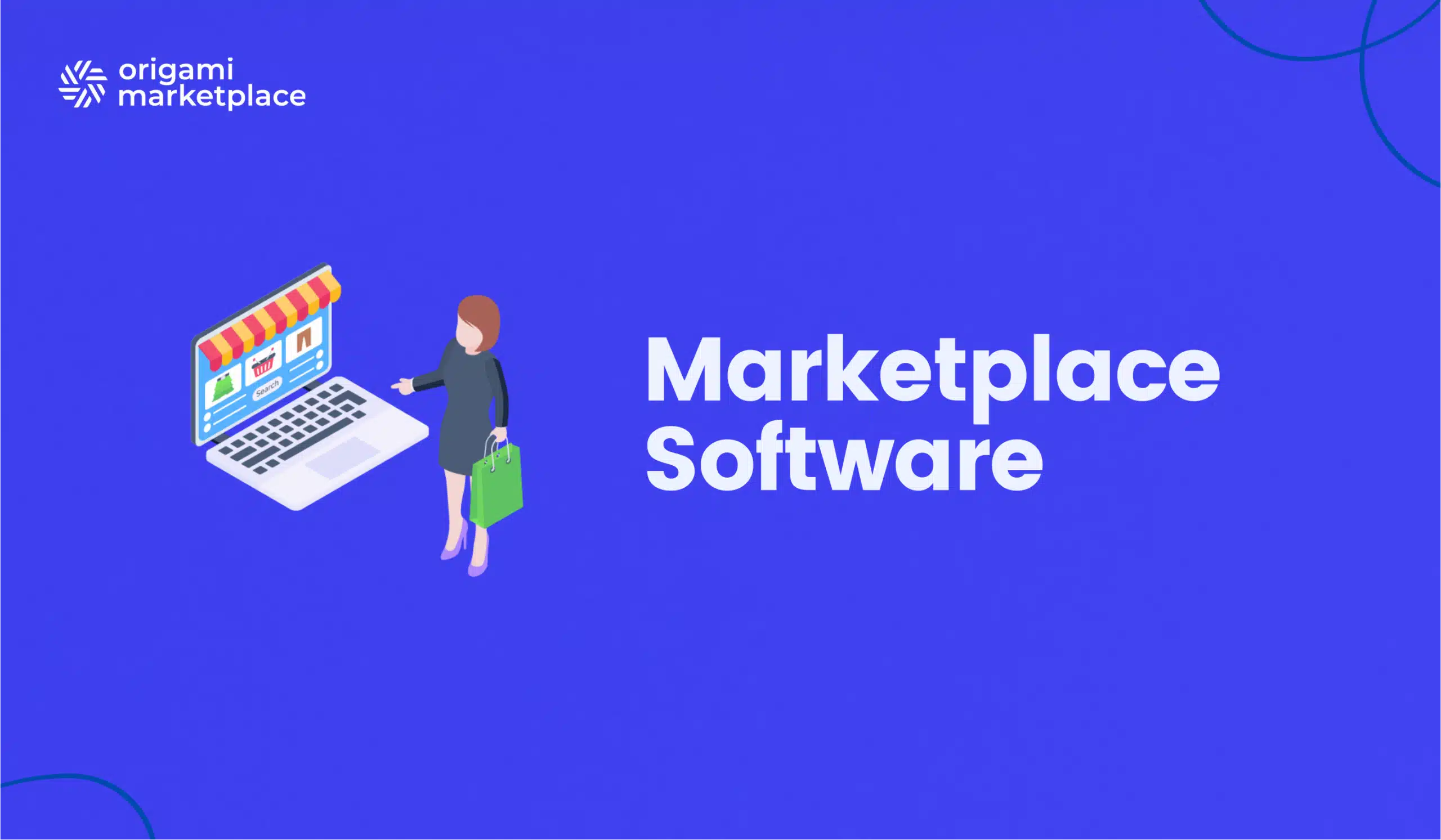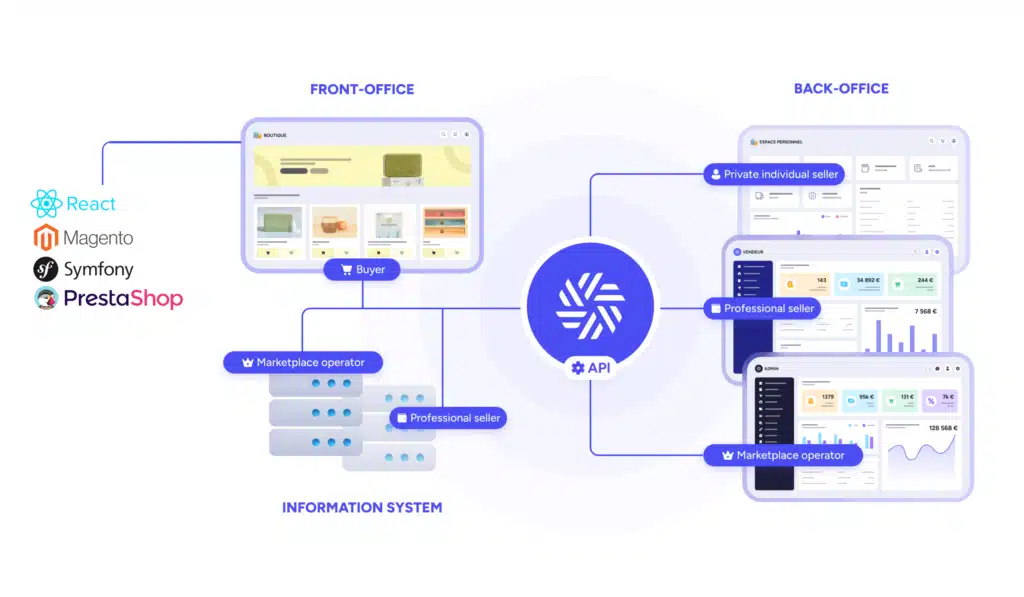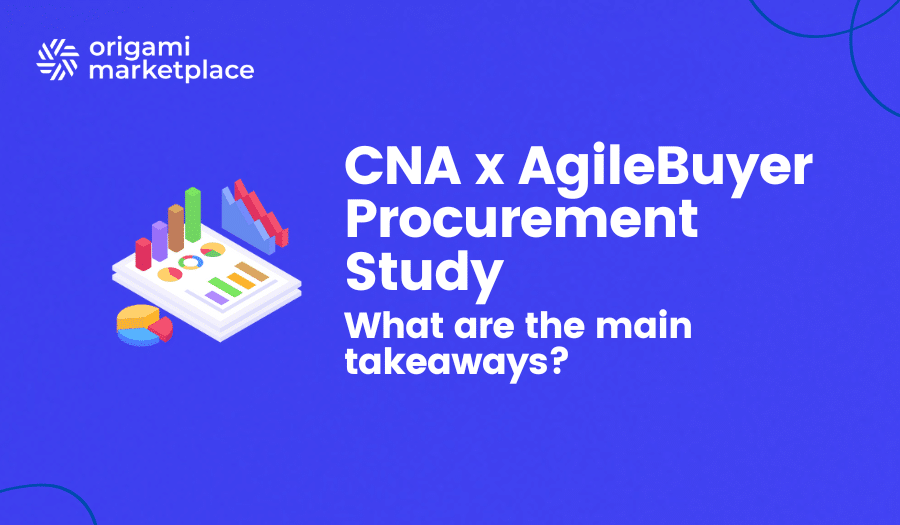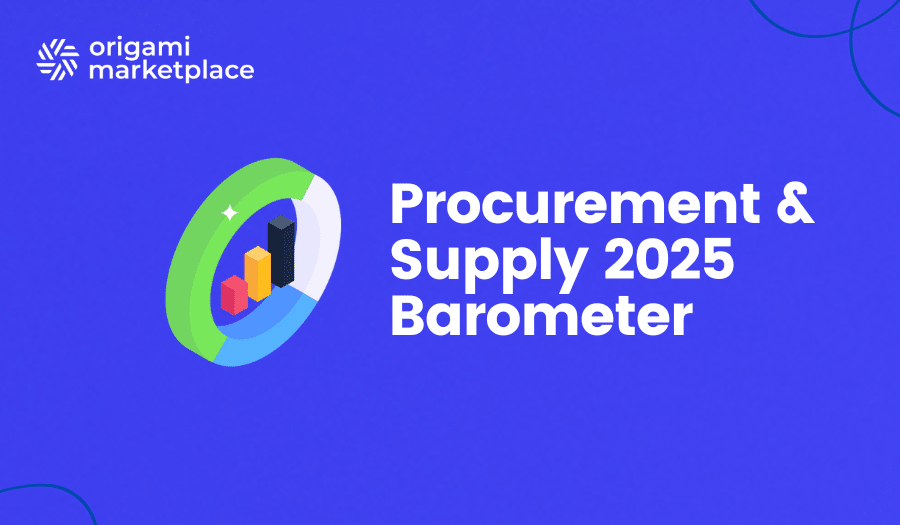Marketplace Software: Compare and choose the best solution
- Arnaud
- 9 minutes reading

Online marketplaces now account for nearly half of global e-commerce sales, making them one of the fastest-growing models in digital commerce. But how do you capitalize on this momentum and launch a high-performing marketplace quickly, easily, and affordably? The key lies in selecting the right marketplace software.
In this article, we’ll walk you through the essential steps to compare different marketplace software options and choose the one that best suits your needs. We’ll also highlight key selection criteria such as marketplace focus, scalability, and security before introducing various solutions available on the market today. Finally, we’ll show why Origami Marketplace stands out as the top choice for operators looking to build a robust, future-proof platform.
1. What is Marketplace Software?
2. The benefits of using an existing Marketplace Software
3. Six key Ccriteria for choosing the right Marketplace Software
4. Top Marketplace Software solutions to consider
5. Costs and budgeting: what to expect
6. Five additional recommendations to reassure marketplace operators
👋 No time to read the whole article? Find the summary here.
1. What is Marketplace Software?
A marketplace software is an out-of-the-box platform designed to help you create and manage a multi-vendor marketplace (B2C, C2C, or B2B). It typically includes:
- Tools for listing products and/or services
- Order and payment processing features
- Vendor and buyer account management
- Logistics and shipping modules
- Reporting and analytics dashboards
By choosing specialized marketplace software, you can avoid the time-consuming (and costly) process of building from scratch, enabling you to launch a minimum viable platform (MVP) in a matter of weeks with all essential functionality already developed.
2. The benefits of using an existing Marketplace Software
- Faster time to market: A pre-built solution allows you to launch a beta version of your marketplace quickly, test your concept, and start earning revenue without months of custom development.
- Reduced costs: Developing marketplace functionality (payments, user accounts, vendor onboarding) in-house requires a specialized tech team and substantial investment. Opting for existing software drastically reduces these expenses.
- Continuous upgrades and maintenance: Most marketplace software vendors handle hosting, security patches, and regulatory updates (e.g., EU payment directives, data privacy laws) so you don’t have to worry about ongoing technical tasks.
- Scalability: Reputable marketplace platforms are built to accommodate growth in vendor and customer volumes no need to constantly optimize performance on your own.
Ready to turn your B2B, B2C, or C2C marketplace vision into reality?
To help you develop the best platform possible, we’ve gathered all the must-have features, key technical considerations, and best practices in a comprehensive document:
Download the Specifications template 🗒
Perfect for smaller or medium-scale projects without a formal purchasing process. It will help you outline your requirements effectively and streamline your selection process.
Download the Request for Proposal template 📒
Ideal for larger, more complex marketplace projects with a formal purchasing department or advanced procurement policies.
3. Six key criteria for choosing the right Marketplace Software
a) Focus and marketplace type: Marketplaces vary widelysome sell physical products, some rent out equipment, and others focus on services or digital goods. Before choosing a platform, ask yourself:
- Is it product-based or service-based? Services often require booking calendars and scheduling; product-based marketplaces need inventory management and shipping integrations.
- C2C, B2C, or B2B? Different models can affect transaction flows, verification requirements, and fee structures.
- Web-focused or mobile-focused? Some solutions prioritize responsive web apps, while others offer built-in mobile apps or APIs for easy app development.
b) Scalability and customization: Your marketplace should grow alongside your business. Two critical aspects:
- Core features vs. extensibility: Look for comprehensive core functionality listings, transactions, messaging, rating/reviews, but also check if you can add or modify features unique to your concept.
- Open source vs. headless architecture: Open-source solutions grant you access to the code for deep customization. “Headless” API-driven platforms allow you to build custom front-ends without sacrificing the robust core. Evaluate the complexity and budget required for each approach.
c) Vendor’s business model and pricing
- Transaction-based or flat-fee: Some vendors align with your success by charging a percentage on each transaction. Others offer monthly or annual licenses. Choose a model that incentivizes the provider to help you thrive.
- Hidden costs: Watch out for low entry prices masking hefty fees for essential modules (payments, analytics, etc.) or advanced support.
d) Included services: Hosting, support, and compliance
- Hosting and maintenance: Many marketplace software providers include hosting in their pricing. If not, verify how easy it is to deploy and maintain on your own servers.
- Customer support: Speed, clarity, and technical depth are key. Test the responsiveness of a vendor’s support team before committing.
- Regular updates: Marketplace laws and regulations evolve quickly (e.g., PSD2, DAC7). Make sure your platform vendor handles compliance updates proactively.
e) References and track record
- Company stability: How long have they been in business? How many active, paying customers do they have?
- Client testimonials: Seek real-world success stories. Ask for references in your sector to gauge performance and reliability.
- Product roadmap: Vendors committed to innovation and continuous improvement give your marketplace an edge in the long term.
f) Security and data protection
- Certifications: Look for PCI-DSS compliance (for payments) and adherence to GDPR if you’re dealing with European customers.
- Infrastructure : Under SaaS, your data lives in a shared environment. Under PaaS or on-premises solutions, you get a dedicated setup but also more technical overhead. Choose based on your security needs and budget.
4. Top Marketplace Software solutions to consider
Origami Marketplace, the most complete and scalable choice.
- Adaptable and scalable: Origami Marketplace is the only solution on the market that can seamlessly address B2B, B2C, and C2C challenges while offering unmatched flexibility. Its modular architecture allows you to add new features, integrate additional functionalities, or completely pivot your business model evolving from B2C to C2C, B2B to B2C, or any configuration to match your strategic objectives. This adaptability ensures a future-proof, profitable, and sustainable investment, perfectly aligned with dynamic market trends.
- Advanced customization: Built with a modular approach and robust APIs, Origami Marketplace gives you the freedom to tailor every aspect of your platform.
- Security & compliance: Hosted on secure servers, regularly updated to meet new regulations, and actively monitored for threats.
- Comprehensive support: Origami’s team offers hands-on guidance from setup to ongoing optimization ensuring a smooth user and vendor experience.
Why it’s the Best Choice ? Origami Marketplace blends extensive native features with high flexibility, letting you go live quickly while reserving the option to add unique features as your business matures. That combination of speed, reliability, and adaptability sets it apart from other offerings.

Sharetribe
- Pros: User-friendly interface, solid for no-code MVPs, quick deployment for simple concepts.
- Cons: Limited advanced customization without deeper development work; specialized use cases may need extra plugins or APIs.
Magento + Marketplace extensions
- Pros: Built on a popular e-commerce platform, extensive developer community, numerous plugins.
- Cons: Installation, maintenance, and customization can be time-consuming and may require a specialized team, driving up costs.
WooCommerce + Plugins
- Pros: Leverages WordPress’s massive plugin ecosystem; straightforward for small to medium-scale projects.
- Cons: May struggle with performance and complexity as your marketplace scales in volume or features.
Other proprietary solutions
- ORO, Mirakl, Spryker, etc.: Well-established solutions with strong track records, but often expensive or geared toward large enterprises.
5. Costs and budgeting: what to expect
When planning your marketplace budget, consider:
- License or subscription fees: A monthly/annual subscription or a commission on each transaction.
- Hosting: Included in SaaS packages, or paid separately in self-hosted or PaaS models.
- Customization: Design, specialized modules, third-party integrations.
- Marketing and acquisition: SEO, online ads, affiliate programs, social media campaigns.
- Maintenance: Ongoing support, upgrades, bug fixes, and security patches some solutions bundle these services.
An all-in-one package (such as Origami Marketplace) that includes maintenance and updates can help you anticipate costs and reduce surprises down the road.

Antoine Mantel
→ Talk to our solution expert.
6. Five Additional Recommendations to Reassure Marketplace Operators
- Review the Product Roadmap: A vendor continuously investing in product innovation helps you stay ahead of market trends (mobile, AI, personalization, etc.).
- Test Customer Service: Send pre-sales questions to gauge response time and technical expertise.
- Check Compliance Management: Regulatory frameworks (GDPR, PSD2) evolve frequently; your partner should handle necessary adjustments seamlessly.
- Ask for Success Stories: Talk to existing clients in your niche for honest feedback on benefits and pitfalls.
- Plan for Growth: Pick software that supports expansion into new geographies, verticals, or revenue models without forcing a major platform overhaul.
Selecting the right marketplace software is a pivotal step toward a thriving business. A misaligned platform can sink months of effort and considerable funds before you realize your idea’s true potential. Conversely, choosing a robust, scalable, and well-supported solution from the start gives you a competitive advantage and sets you on a solid growth trajectory.
Of all the solutions out there, Origami Marketplace stands out for its extensive out-of-the-box functionality, powerful customization options, and exceptional ongoing support. It’s the trusted, future-focused choice for operators who want to launch, grow, and sustain a successful marketplace.
Ready to learn more? Contact our Origami Marketplace team to discuss your project, discover our full feature set, and see how we can help you build a top-tier marketplace no matter your size or industry.
Key Takeaways
- Compare solutions based on focus (products vs. services), scalability, and quality of customer support.
- Align with vendors who have a revenue model that reflects your growth and long-term success.
- Verify that security, maintenance, and compliance are handled proactively to avoid hidden risks.
- Look for proven track records and product roadmaps that guarantee a future-proof marketplace platform.
- Choose Origami Marketplace for a comprehensive, highly customizable, and growth-friendly solution that supports your marketplace journey from day one.
With these insights, you’ll be well on your way to selecting a marketplace software that empowers your vision and scales alongside your ambitions.
Discover how Origami Marketplace’s API and partner network can transform your business, regardless of its size, with its innovative marketplace-based solution. Good luck and happy launching!


